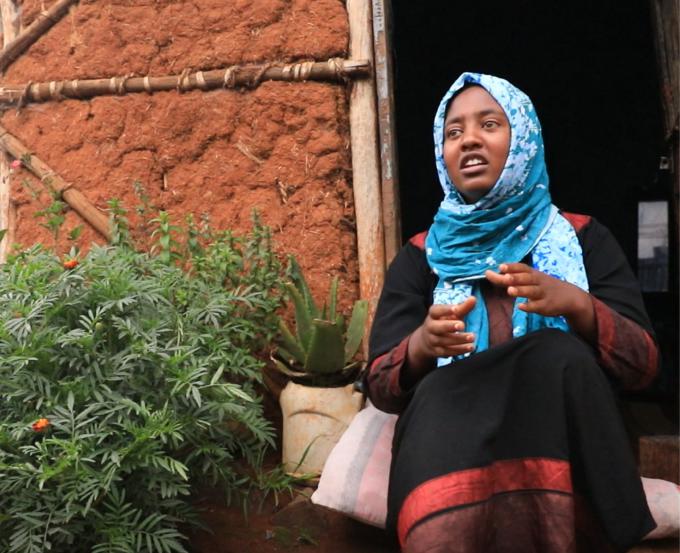Learning from home is not the same as going to school: Saeda’s story

Saeda is a 14-year-old girl who lives with her parents and her brother in Addis Abeba, Ethiopia. Saeda is an 8th grader and a member of the children’s parliament in Addis Abeba that Save the Children supports through different local partners and school clubs. The support ensures that children and particularly adolescent girls like Saeda are meaningfully engaged in matters affecting their rights and advocate for other children’s rights themselves.
However, Since COVID-19 struck Ethiopia; Saeda has been unable to attend school. She feels sad about this as she loves learning and reading. As part of our documentation of the voices of children on the pandemic, Save the Children in Ethiopia speaks to Saeda to learn about her views and experiences.
“I used to go to school before Coronavirus; I used to learn in a classroom. Furthermore, I used to see my friends and teachers every day. I had interaction with my peers in the neighbourhood. Now all that has been impossible because of the virus,” says Saeda.
As Saeda recounts how life had changed because of Coronavirus she feels sad that she is not able to play with her friends like she used to. But above all she worries about the people dying of the virus as well as those who are facing food shortages while staying at home. Seada keeps herself happy during these times by reading books for fun as well as knowledge. The time that she could spare from her reading, she spends it on finishing up writing her short story collections.
“I learnt an important lesson in these times. What I realized when I’m at home is learning from home is not the same as going to school. When we’re studying at school, our teachers are always available to us and we can ask them any questions when it’s unclear. But when you’re studying at home, it’s quite difficult to ask for their guidance. I’m highly appreciative of our teachers’ efforts and had developed a respect for their profession,” Saenda says.
She looks forward to the time when school is finally open, life returns to normal and Coronavirus becomes history. “I think this is a good learning experience for all people around the world. People have stopped going to school, works and so forth due to the virus. So, people should realize what they have lost. To the students, I hope they realize that studying from home and going to school are very different. They should be more appreciative as well as respectful towards their teachers. And working people should be more professional as well as dedicated to their respective jobs,” she adds.
She shares some of the concerns regarding her observations in her neighbourhood and the country as a whole. “People are advised to stay at home due to the virus. However, most people are disregarding that and going out. So, what I’m saying to the people who don’t want to stay at home is; listen to the advice given by the government and medical professionals. Exercise all the necessary precautions.”
Saeda is also apprehensive about the wellbeing of children during these COVID-19 times. “I don’t believe all children who are staying at home enjoy ideal situations. As I had said before there are children who do not live with their parents. They might not get the proper treatment, education or feel overwhelmed due to excessive chores at home. I think children might feel loneliness due to these factors. The government used to have feeding and clothing programs in schools. Children were able to focus on their education without succumbing to hunger. But now that they’re staying at home, they face the risk of being malnourished.”
Saeda has this last message to the people in positions of authority. “My message is to all that are in positions of power. But since Africa in general and Ethiopia in particular is home to millions of children. I would like Ethiopian government officials to be more proactive towards protecting children. Children are living with their parents, with relatives and the not so fortunate ones are living on the streets. It would be nice if the government keeps an eye out on the conditions of these children and help out when necessary. Before the Coronavirus, children could benefit from school feeding programs. But now, parents with low income are struggling to keep food on the table. It would be good if the government lends out a hand for these kind of families until the stay at home period ends. Furthermore, children who live on the streets run the risk of getting infected with the coronavirus. So, the government should set up some sort of shelter for them.”
 Ethiopia
Ethiopia